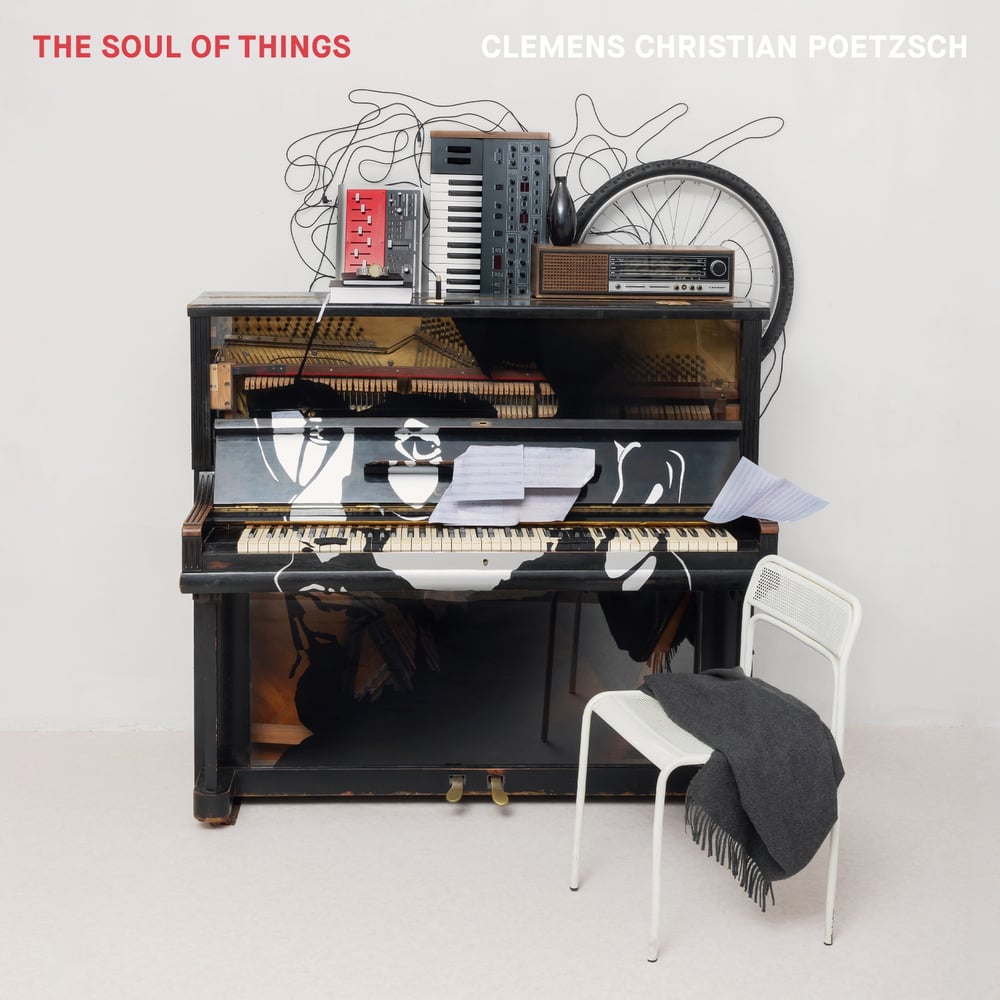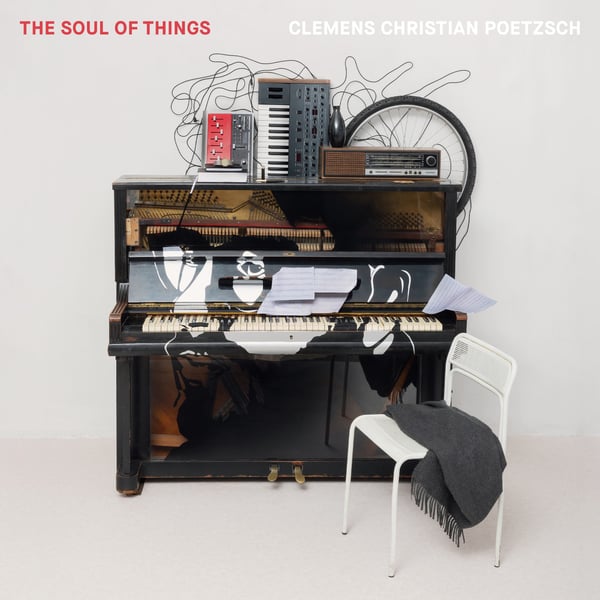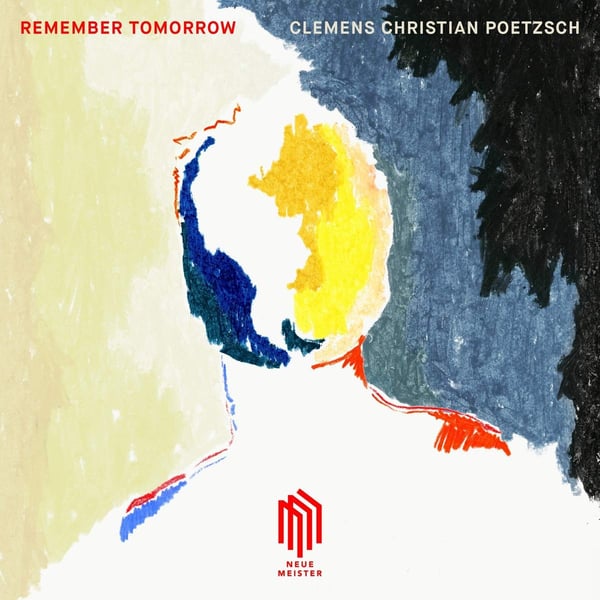The Soul of Things (VINYL)
20,00 €
(Currently not shipping overseas at the moment - only GERMANY)
2020 was a spring-clean year. Locked-away within our own homes, armed with a broom and bin bags, many of us finally got the time for those long overdue house-chores; tidying up the closet, fixing that wobbly shelf, tending to the garden and discarding all kinds of accumulated stuff. For some more nostalgic souls, tidying up is a lost cause – it simply becomes impossible to throw away things, regardless of their utility, because they are imbued with meaning. “Then there is this stool, which admittedly is quite ugly and not really comfortable either. It somehow managed to stick around, although it doesn't fit in with the environment,” says the German pianist Clemens Christian Poetzsch, “It reminds me of the past and yet it is also in constant use.” Poetzsch might not have gotten around to clearing-out his house in 2020, but he did write a new album based entirely on the very objects he could never throw away.
The Soul of Things – a fusion of solo piano, harp, cello and electronics – draws inspiration from the mundane. The album can itself be heard as an ode to the ordinary things – a particularly good fountain pen, an old radio receiver – that somehow, in their very familiarity become extraordinary to us. “There are many inexplicable things in relation to these objects and their meaning for you. There is a certain magic about it,” says Poetzsch. The thirteen tracks that constitute The Soul of Things are named after these banal objects and in their musicality attempt at conveying such artefacts’ personalities and souls. Take the piece ‘Indigo Feder’ (fountain pen) for instance, a gentle piano tune that in its changing tempo is reminiscent of the act of writing or doodling, “This pen is a piece of craftsmanship – it writes round, it feels soft. The piece should flow, sometimes slower, sometimes faster like writing down thoughts in real time,” explains Poetzsch. Just like the pen, Poetzsch’s clock gains a life of its own in the track ‘Ziffernblaetter’. “This is an old watch that looks very nice but doesn't really work anymore. It ticks how it wants. The piece also jumps back and forth with the beat, it almost sounds as if it's making fun of itself,” says Poetzsch who gave the old timekeeper a noble character by combining two grand instruments – harp and piano – on the track.
The Soul of Things is filled with expressiveness and vivacity. Enough to animate inanimate things. It’s soulfulness is primarily given through Poetzsch’s deep familiarity with the piano, his medium of expression since he was a young boy. Despite his musical maturing over the years he still favours composing on his childhood, GDR-era piano, over new fancy alternatives, “It's a pretty unstable piano, the tuner has to come very often. I could probably have bought a new one with the money, but because I played my first notes on it I have a very strong connection to it and that makes it very easy for me to be creative,” he explains. This acquaintanceship and intimacy with the piano can be felt in the ease with which Poetzsch gives in to improvisation in his music. As a matter of fact, intimacy is noticeable in every piece of The Soul of Things, as if with every object, Poetzsch was having a conversation with an old friend, “I was particularly interested in the objects that you use regularly and that are part of everyday life. Items that you wouldn't give away. That you like to have around you, that you like to touch.” Despite the feeling of familiarity so present in the album, Poetzsch wasn’t afraid to get out of his comfort zone for The Soul of Things. His approach to experimentation is simply to dive in and see what works, to discover through trial and error.
Besides piano, harp and cello, the album, for example, includes electronic gear that Poetzsch admits to “mistrusting” in the past. It comes back to freedom – to create without limits, and to dissolve preconceived notions around genres and instruments. In the track ‘Apparat’, based on his old radio receiver, he uses synthesizers to convey the fidgety frequencies of the device. At the same time, juxtaposing this strong electronic element with a melancholic cello melody infuses the track with nostalgia, “Looking at my old radio shows me how fast time flies. Twenty-five years ago it was an incredible device, today it is almost useless,” explains Poetzsch. The Soul of Things continues to build on Clemens Christian Poetszch’s discoveries with his previous solo album, Remember Tomorrow – away from the staid world of classically harmonic language towards something more contemporary, more individual. The tracks in the album stand as selfcontained worlds with their own logic and language. Conceived as an album about subjects, it actually tells volumes about the relationships and stories behind and usually hidden from everyday life. The artwork, an installation, designed by the Lithuanian concept artist Jolita Vaitkute, tells the story of these mundane objects, which become symbols and statues representing a world that is in fact invisible. Music becomes the means to stir up memories and fragments of remembrance, and The Soul of Things is an attempt of making sense of it all, of bridging that gap between the physical and metaphysical worlds. It really comes as no surprise that Poetzsch can’t bring himself to throw away that old bench after all.
--
Für die putzfreudigen Seelen unter uns bot 2020 sicher genügend Luft – für einen ausgedehnten Frühjahrsputz oder das lang verdrängte Aufräumen von vernachlässigten Ecken und Speichern. Ausgestattet mit Müllsack und Besen ging es also ans Werk: Schränke aufräumen, das wacklige Regal reparieren, oder einfach mal alles wegwerfen, was eigentlich doch nicht mehr gebraucht wird. Doch Halt! Nicht nur die nostalgischen Gefährten unter uns werden hier und da innegehalten haben: War dieses oder jenes nicht doch auch wertvoll – sicher nicht im Hinblick auf Geld. Aber wegen der Erinnerungen, die damit verknüpft sind? Entpuppte sich die angedachte Entrümpelungsaktion nicht vielleicht auch als besondere Schatzsuche? Der Pianist Clemens Christian Poetzsch ist zwar nicht dazu gekommen, sein Haus im Jahr 2020 zu entrümpeln, aber er hat in dieser besonderen Zeit ein neues Album geschrieben, das ganz auf den Gegenständen basiert, die er einfach nicht wegwerfen könnte: "Es gibt da diesen Hocker, der zugegebenermaßen ziemlich hässlich ist und auch nicht wirklich bequem. Irgendwie hat er es aber geschafft, hier zu bleiben, obwohl er nicht in die Umgebung passt", sagt Poetzsch. „Er führt mich in die Vergangenheit und wird trotzdem ständig benutzt“.
Sein neues Werk heißt treffend The Soul of Things und ist inspiriert vom Alltäglichen, die keineswegs alltäglich ist: Solopiano, kombiniert mit Kompositionen für Harfe, Cello, Piano und Electronics. Das Album selbst kann als eine Ode an die ganz gewöhnlichen Dinge wie ein besonders guter Kugelschreiber oder ein altes Radio gesehen werden – Gegenstände, die irgendwie, in ihrer bloßen Vertrautheit außergewöhnlich und unentbehrlich für uns werden. „Es gibt viele unergründliche Dinge in Bezug auf diese Gegenstände und ihre Bedeutung für einen selbst. Es liegt ein gewisser Zauber darin", sagt Poetzsch. Die 13 Tracks, die das Album The Soul of Things enthält, sind nach diesen banalen Gegenständen benannt und versuchen in ihrer Musikalität die Persönlichkeiten und Seelen dieser Artefakte zu beschreiben.
Zum Beispiel das Stück Indigo Feder, das mit einer sanften Klaviermelodie in einem wechselnden Tempo an den Akt des Schreibens oder Kritzelns erinnert: „Dieser Stift ist ein Stück Handwerkskunst - er schreibt rund, er fühlt sich geschmeidig an. Das Stück soll fließen, mal langsamer, mal schneller, als würde man Gedanken in Echtzeit aufschreiben", erklärt Poetzsch. Genau wie der Stift bekommt auch Poetzschs Uhr in dem Stück Ziffernblaetter ein gewisses Eigenleben. "Es handelt von einer alten Uhr, die sehr schön aussieht, aber nicht mehr wirklich funktioniert. Sie tickt, wie es ihr gefällt. Auch das Stück springt im Takt hin und her, es klingt fast so, als würde sie sich selbst auf die Schippe nehmen", sagt Poetzsch, der dem alten Zeitmesser einen edlen Charakter verlieh, indem er auf dem Track zwei große Instrumente – Harfe und Klavier – miteinander verbindet.
The Soul of Things ist voller Ausdruckskraft und Vitalität. Genug, um leblose Dinge zum Leben zu erwecken. Die Seele entsteht vor allem durch Poetzschs tiefe Verbundenheit mit dem Klavier, seinem Ausdrucksmittel seit frühester Kindheit. Trotz seiner musikalischen Reifung über die Jahre komponiert er immer noch lieber auf seinem Jugendklavier aus DDR-Zeiten als auf neuen, schicken Varianten: "Es ist ein ziemlich instabiles Klavier, der Stimmmeister muss sehr oft kommen. Mit dem Geld hätte ich mir wahrscheinlich ein neues kaufen können, aber weil ich meine ersten Töne darauf spielte, habe ich eine sehr starke Verbindung dazu und es fällt mir dadurch sehr leicht, damit kreativ zu sein", erklärt er. Diese Vertrautheit und Intimität mit dem Klavier ist auch in der Leichtigkeit zu spüren, mit der Poetzsch sich der Improvisation in seiner Musik hingibt. Überhaupt ist die Intimität in jedem Stück von The Soul of Things spürbar, als würde Poetzsch mit jedem Objekt ein Gespräch wie mit einem alten Freund führen: "Mich haben vor allem die Gegenstände interessiert, die man regelmäßig benutzt und die Teil des Alltagslebens sind. Gegenstände, die man nicht weggeben könnte. Die man gerne um sich hat, die man gerne berührt."
Trotz des Gefühls der Vertrautheit, das im Album so präsent ist, hatte Poetzsch keine Angst, für The Soul of Things aus seiner Komfortzone herauszukommen. Sein experimenteller Ansatz ist es, einfach einzutauchen und zu testen, um durch Ausprobieren zu entdecken, was funktioniert. Letztlich geht es um Freiheit – ohne Grenzen zu errichten und darum, vorgefasste Meinungen über Genres und Instrumente aufzubrechen. In dem Track Apparat, der seinem alten Radioempfänger gewidmet ist, setzt er Synthesizer ein, um die wackeligen Geräusche und Frequenzen des Geräts zu vermitteln. Gleichzeitig erzeugt die Gegenüberstellung dieses elektronischen Elements mit einer melancholischen Cello-Melodie eine nostalgische Stimmung: "Wenn ich mir mein altes Radio so ansehe, wird mir klar, wie schnell die Zeit vergeht. Vor fünfundzwanzig Jahren war es ein fantastisches Gerät, heute ist es fast nutzlos", erklärt Poetzsch.
The Soul of Things knüpft an die Entdeckungen an, die Clemens Christian Poetzsch mit seinem letzten Soloalbum Remember Tomorrow gemacht hat – weg von der klassisch-harmonischen Sprache hin zu etwas Zeitgemäßerem, Individuellerem. Die Stücke des Albums stehen als in sich geschlossene Welten mit eigener Logik und Sprache. Passend dazu wurde das Cover zum Album von der litauischen Künstlerin Jolita Vaitkutė gestaltet, die Gegenstände mit thematischem Bezug zum Album in einer Installation zusammengestellt hat.




